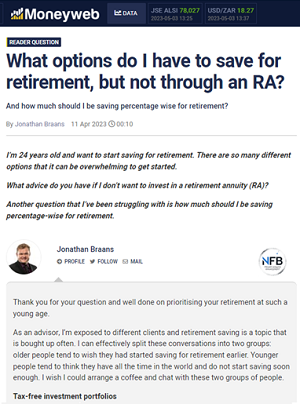What options do I have to save for retirement, but not through an RA?
And how much should I be saving percentage wise for retirement?


[Reader Question]
I’m 24 years old and want to start saving for retirement. There are so many different options that it can be overwhelming to get started.
What advice do you have if I don’t want to invest in a retirement annuity (RA)?
Another question that I’ve been struggling with is how much should I be saving percentage-wise for retirement.
Thank you for your question and well done on prioritising your retirement at such a young age.
As an advisor, I’m exposed to different clients and retirement saving is a topic that is bought up often. I can effectively split these conversations into two groups: older people tend to wish they had started saving for retirement earlier. Younger people tend to think they have all the time in the world and do not start saving soon enough. I wish I could arrange a coffee and chat with these two groups of people.
Tax-free investment portfolios
Getting into the specifics of your question, there are many alternatives to traditional retirement annuities that can help you on your way to a comfortable retirement. The first of these is a tax-free investment portfolio or tax-free savings account (TFSA). These products, as the name suggests, are completely free of any capital gains (CGT), dividend or income tax. You are allowed to contribute a maximum of R36 000 per tax year, up to a lifetime limit of R500 000. This means, if you start contributing R36 000 per year from now, it will take just under 14 consecutive years of full contributions (that is, when you are 38) to hit the lifetime limit. Once you have reached the maximum lifetime contribution level, you can continue to preserve the investment for the next 25 years until you retire. Any growth or income is not taxable, so the compounding effects are material. Furthermore, you are not constrained by Regulation 28 in a TFSA and can therefore invest as you deem fit.
I would recommend structuring a TFSA with a high offshore equity weighting if you are investing for the long-term.
Endowments
An endowment is an investment product that is issued by a registered life insurance company and governed by Section 54 of the Long-Term Insurance Act. It provides for a minimum investment term of five years. Within the five-year restriction period, one interest free loan and one surrender are allowed after the first 12 months, limited to premiums plus 5% per annum. After this, part or all of the investment is accessible during the investment term, via redemption/repurchase payments or interest free loans. Investment income is taxed on the four fund basis of taxation within the policy, as is any applicable CGT.
In the case of individuals this equates to income tax of 30% and CGT of 12%. It is therefore a very tax efficient product for higher income earners. As the goal is to save for retirement, liquidity should not be an issue. Furthermore, although you may not be a high earner now at the age of 24, your earnings, and therefore tax profile, will increase as you move through career stages. This makes an endowment an efficient product from a tax perspective.
Unit trust investments
These products are not particularly tax efficient, but they are also not constrained by Regulation 28 and are very flexible. Income can be turned on and off or increased, or decreased as the client sees fit. They also allow for ad hoc withdrawals with no restrictions should the need for liquidity arise. Capital gains realised on the disposal of underlying portfolios or withdrawals from the investment are subject to CGT. This can be as high as 18%, depending on your marginal tax bracket.
Comment on RAs
While I have tried to provide some alternatives to retirement products in the above answers, I encourage you to perhaps ask yourself why you are so against RAs. Yes, RAs are subject to Regulation 28 which imposes limits on riskier assets such as local and foreign equity, local and foreign property, hedge funds, and a separate overall limit for offshore assets. However, this has been somewhat subdued after offshore limits were recently increased to 45%.
The tax benefits of an RA are material. Based on current legislation no income tax, dividend tax or CGT is payable on an RA. In addition, RA contributions are tax deductible, meaning your contributions, up to certain limits, can be claimed as an income tax deduction in the form of a SARS rebate.
To answer the last part of your question, it is always difficult to gauge an exact amount of how much you should be saving for retirement. There are lots of factors to consider, including:
• How long you want to work
• How much income will you need in retirement; and
• How long you may live
A few decades ago, not many people were living to 95 but we are now seeing people live longer and longer due to medical advancements.
As a general rule to a young person starting out, I always say you should try and save between 12-15% of your gross salary.
If your gross monthly salary is R25 000 per month you should look to save at least R3 000 per month in an investment product.
In conclusion, there are alternative options to RAs that can enhance your retirement savings strategy. However, these should be used in conjunction with an RA as RAs still provide the most tax efficient platform from which to save for retirement. I encourage you to speak to a qualified financial advisor who can help you achieve your goal of a comfortable retirement.
 |
This article was published on Moneyweb, 11 April 2023. To read more from Jono, click here |













